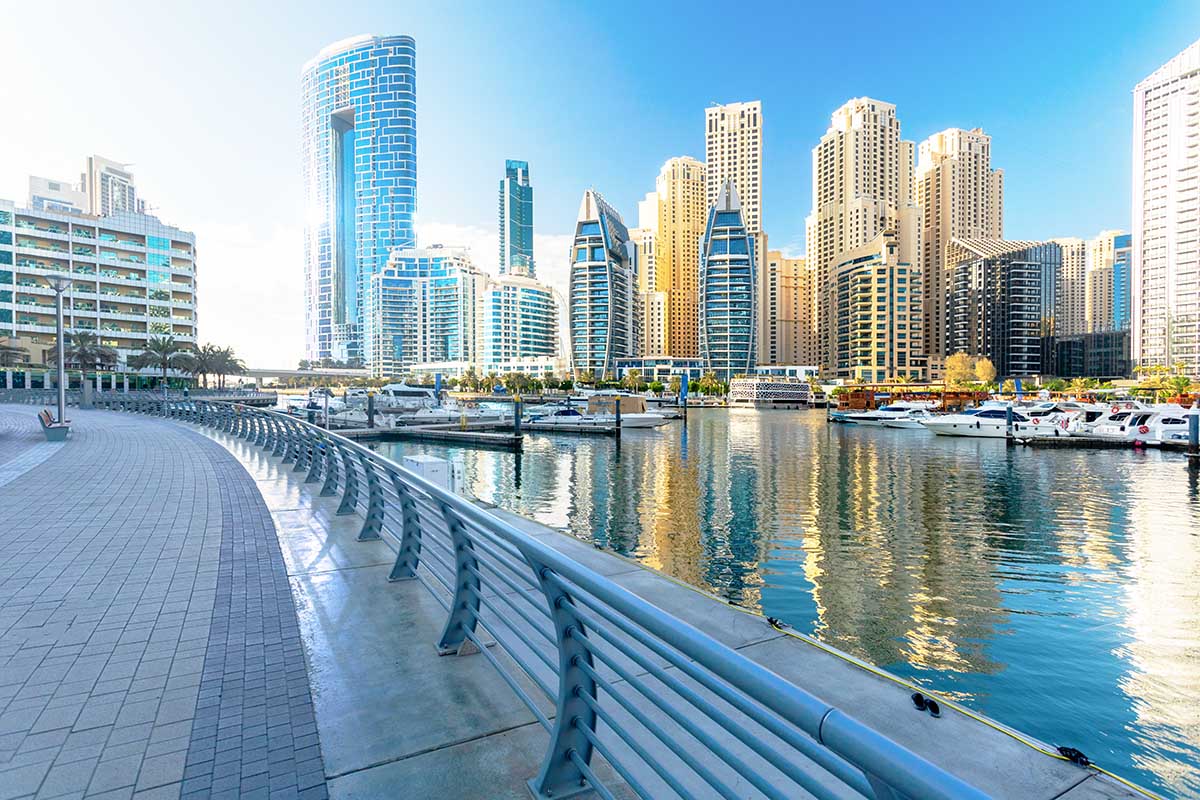Is It Safe to Buy Property in Dubai?
Yes, it is very safe to buy property in Dubai, especially for foreign nationals like Americans. That said, you should approach it with caution to avoid risks like ownership disputes, stalled developments, and overpaying. The safety of your property investment depends on you researching developers, verifying property details, and understanding market conditions.
Partnering with DRUS gives you expert guidance, connects you with licensed brokers and developers, and ensures you invest in Dubai’s property market with complete confidence and transparency. We guide you through every step of the process, from selecting the ideal property to closing and beyond.
Contact us today if you’re considering buying property in Dubai. Our California-based Dubai real estate team will guide you through every step of the Dubai property purchase process.
Why is it Safe to Buy Property in Dubai?
Buying property in Dubai is generally safe for Americans and foreigners because the market is closely regulated by the Dubai Land Department (DLD) and RERA, which oversee developers, brokers, and all property transactions. DLD and RERA ensure that the rights of foreign buyers of Dubai property are protected to the fullest extent of Dubai law.
Americans and foreigners are able to achieve 100% freehold ownership of Dubai properties in designated areas, giving them full rights to buy, sell, lease, and pass on Dubai property.
Off-plan payments are safeguarded in escrow accounts, while titles and contracts are verified digitally to prevent fraud and ensure transparency.
Rental disputes are handled by the Rental Dispute Center, ensuring fair outcomes.
Additionally, mortgage caps reduce risky lending, and the UAE dirham is pegged to the U.S. dollar, protecting American buyers from currency volatility.
With these strong legal and financial protections in place, Dubai offers U.S investors one of the safest and most transparent real estate markets globally.
Why is Dubai’s Property Market Categorized as “Very Safe?”
When people say Dubai’s property market is “very safe,” it doesn’t mean risk-free; it simply means the rules are transparent, the processes are public, and enforcement is real.
Here is what sets Dubai apart:
1. Clear and Transparent Rules
Dubai Land Department (DLD) and the Real Estate Regulatory Agency (RERA) clearly define who can sell property, how buyer funds must be handled, and how every transaction is documented. Escrow accounts are mandatory for off-plan purchases, and each sale is logged through official systems, such as Oqood. Buyers can access and verify these records themselves online, reducing reliance on intermediaries and minimizing fraud risk.
2. Publicly Accessible Services
One of Dubai’s strongest safeguards is the accessibility of government tools. Buyers can verify title deeds, confirm ownership, and track construction milestones of off-plan projects through DLD’s digital platforms. This transparency eliminates much of the uncertainty common in other global markets, enabling buyers to verify information directly at the source before committing funds.
3. Enforceable Rights and Legal Backing
Paperwork in Dubai isn’t just procedural, it’s enforceable. Rental and ownership disputes are handled by the specialized Rental Dispute Center (RDC) and, if necessary, escalated to courts. This means contracts carry real weight, and remedies exist if terms are breached. The presence of structured legal mechanisms reassures investors that agreements aren’t just symbolic but legally binding.
4. Macro-Level Stability
Beyond property-specific rules, Dubai’s broader financial framework provides an additional layer of security. The UAE Central Bank enforces mortgage caps to prevent excessive borrowing, limiting systemic risk. Meanwhile, the dirham’s peg to the U.S. dollar stabilizes currency value, shielding U.S. and dollar-based investors from exchange-rate shocks. This combination of prudential regulation and monetary stability ensures predictability in financing and property valuation.
What are the Safest and Best Places to Buy Property in Dubai?
When it comes to purchasing property in Dubai, safety and long-term value matter most to many Americans and foreign property buyers. Some of the prime locations in Dubai include Dubai Marina, Downtown Dubai, JVC, and Dubai Hills Estates. These areas attract property buyers because of their luxury properties, vibrant lifestyles, safety, and steady rental demand.
Dubai Hills Estate offers a family-friendly community with green spaces, schools, and strong growth potential, while Palm Jumeirah delivers unmatched prestige and exclusive beachfront living.
For affordability, Jumeirah Village Circle appeals to buyers seeking steady appreciation, while Business Bay attracts professionals with its central location and modern residential and hotel units.
Dubai supports foreign ownership in freehold zones, making it easy for international investors to secure assets without heavy property taxes.
Whether you’re focused on lifestyle or investment, owning property in these areas combines safety, high-quality infrastructure, and substantial property value growth. From luxury living to affordable options, Dubai remains one of the best global markets for property buyers.
The Regulatory Backbone: DLD + RERA.
Dubai centralizes real estate under the DLD, with regulation handled by RERA. This structure licenses brokers and developers, establishes rules for owning Dubai real estate, and operates official services, including title registration, project tracking, and fee calculation. Having a single, accountable regulator like the DLD is the primary reason why the Dubai real estate market operates safely and predictably for foreign investors, such as Americans.
Escrow Accounts: The Protector of Off-Plan Buyers.
If you’re buying an “off-plan” (under construction) property in Dubai, you should feel safe doing so. You should feel safe because your payments don’t go straight to a developer’s general account. Instead, Dubai’s Escrow Law (Law No. 8 of 2007) requires developers selling off-plan to open a project-specific escrow account with an approved trustee bank. Your funds are deposited into an escrow account and are only released to the developer as construction milestones are certified. This significantly reduces the risk of misuse and helps ensure the project’s completion and the delivery of your off-plan unit.
Verifiable Ownership From Start to Finish.
Dubai uses two complementary systems so buyers can verify ownership and progress at each stage:
- Title deeds (ready properties): You can verify a property’s title and status directly through DLD services. This confirms the legal owner and encumbrances before you commit.
- Oqood (off-plan): For units under construction, DLD’s Oqood system records and manages provisional ownership contracts until the final title deed is issued. It’s a digital audit trail that protects buyers through the build phase.
In practice, you should verify both the project’s registration and escrow details, as well as the unit’s Oqood record (for off-plan properties) or the title deed (for completed properties).
Foreigners Can Own Freehold In Designated Areas of Dubai.
According to the Dubai Land Department, one of Dubai’s key investor-friendly policies is that non-UAE nationals, such as Americans, can own freehold property outright in designated zones within Dubai, with full ownership rights to live in, sell, lease, or bequeath the property. The DLD’s own buyer guides explain these “Designated Areas” and the rights that attach. This clarity about where and how foreigners can own is a primary stability signal to foreign buyers and Americans.
If Something Goes Wrong: Fast, Specialized Dispute Channels
For landlord–tenant issues, Dubai established the Rental Disputes Center (RDC), a dedicated judicial forum designed to resolve rental conflicts efficiently, reducing the time, cost, and uncertainty that can plague property markets elsewhere. The DLD also explains RDC’s broader role and mandate publicly, which helps set expectations for both owners and tenants.
Mortgages Are Regulated to Avoid Over-Leverage.
The Central Bank establishes mortgage rules in the UAE and includes loan-to-value (LTV) caps that vary by buyer profile and property type (completed vs. off-plan). Caps help prevent speculative bubbles and protect households from financial risks. For expats buying a first, completed home under AED 5 million, typical maximum LTVs are set by regulation; off-plan lending is capped tightly to manage construction risk. Banks’ product pages reflect these regulatory caps in practice.
Currency Stability Helps International Buyers, Including Americans.
Dubai property prices are priced in UAE dirhams (AED), a currency pegged to the US dollar (roughly 3.6725 AED = 1 USD). The Central Bank publicly affirms its policy to maintain its peg to the US dollar and shows the reference exchange rates it manages. For dollar-based buyers, that reduces FX volatility in both purchase and rental income calculations, which is another quiet but meaningful safety feature that the Dubai real estate market provides to Americans.
The Safety of Dubai as a City.
Safety isn’t only about legal frameworks; it’s also about the quality of daily life. Dubai consistently ranks as one of the safest cities in the world, with very low crime rates compared to major global hubs. On online platforms, the city of Dubai scores high on safety indices, showing strong public confidence in personal security, day or night. These ratings, while based on crowd-sourced data, are reinforced by Dubai’s reputation for order, efficiency, and strict law enforcement.
The government invests heavily in security infrastructure, intelligent surveillance, and community policing, which helps maintain an environment where residents and investors feel protected. Violent crime is very rare, and petty theft rates remain significantly lower than those in many Western cities. This stable environment translates directly to the real estate market: buyers know their assets are not only legally protected but also physically secure.
For Americans and foreign nationals, this sense of security is a major factor in choosing Dubai as a place to live, work, or invest. When combined with transparent property regulations, strong governance, and economic stability, Dubai’s commitment to public safety makes property ownership not just a legal safeguard but also a lifestyle choice rooted in confidence and peace of mind.
Government-Backed Residency Pathways for Property Investors.
Not only is property ownership in Dubai safe, but it can also open doors to residency. Depending on how much you invest in Dubai property, you may qualify for one of the two following long-term residency visas:
- Investor visa (often 2 years): Generally available to those who buy a property that is AED 750,000 or more.
- 10-year Golden Visa: Available to individuals who buy a property that is worth AED 2 million or more. Multiple properties can be combined to meet the AED 2 million threshold.
How to be Safe When Buying Property in Dubai.
Use these practical steps to keep your risk low and your confidence high:
- Verify the professionals. If you’re investing from the US, work with DRUS. We are licensed real estate agents based in California, and we only work with RERA-licensed brokers and property developers. DLD publishes registries you can search. Licensed parties are subject to rules, audits, and penalties, whereas unscrupulous unlicensed actors are not.
- Validate the property or project.
- For ready units: Use DLD’s Property Status and Title Deed Verification services to confirm ownership, liens, and readiness.
- For off-plan units: Confirm the escrow account exists for that specific project and check the project status via DLD / Dubai REST.
- Check the paperwork. Ensure your sale contracts (and, if mortgaged, your bank’s documents) reference the correct unit, project, and escrow details.
- Budget for fees and service charges. DLD’s service-fee indicators and fee calculators make costs transparent in advance, allowing you to review these and avoid fee surprises after handover.
- If renting out: Know how the RDC works and keep tenancy contracts compliant with Dubai norms. Good paperwork prevents most disputes; RDC exists to resolve the rest.
Off-Plan vs. Ready: Which Form of Dubai Property Is Safer?
Both can be safe; they’re just different:
- Off-plan properties offer attractive prices and payment plans. The Escrow Law and project registration rules are designed to protect buyers during construction. Your job is to confirm the escrow and monitor progress through official channels. When you buy an off-plan property, your funds are deposited into an escrow account. Escrow funds are only released to developers after certain project milestones are reached.
- Ready properties give immediate occupancy and rental income. You should perform due diligence that focuses on the title, any existing mortgage, the building’s owners ‘ association health, and service charges. DLD’s tools help you verify these before transfer.
DRUS helps American investors looking to buy off-plan Dubai properties find and close on such properties. We have partnered with Dubai’s top off-plan property developers to bring you investment properties in the best areas of Dubai. We make the buying process as easy as possible for American investors. We even offer Dubai Gold Visa assistance for property buyers who want to make Dubai their new home.
Risk Factors and Strategies for Mitigation.
Every property market carries risk, and Dubai is no exception. The key is not avoiding risk entirely, but understanding where it lies and how Dubai’s legal and regulatory framework helps manage it.
Here are the most important factors buyers should watch closely:
1. Developer Risk (Off-Plan Purchases)
Buying property before it’s built offers attractive pricing but carries execution risk. The safest path is to work only with Dubai Land Department (DLD)–registered developers. By law, all off-plan payments must go into escrow accounts tied to specific projects. Buyers should verify escrow details and use official DLD apps to monitor construction progress before releasing staged payments. This system greatly reduces the risk of delays or non-completion.
2. Title and Ownership Verification (Completed Units)
For ready-to-move-in units, the main danger is hidden encumbrances like mortgages, disputes, or unpaid service charges. Before signing, request an official title deed from the DLD and confirm the property’s legal status. This ensures you aren’t buying into unresolved debts or ownership conflicts. Professional conveyancing support can also add an extra layer of protection.
3. Service Charges and Ongoing Fees
Ongoing costs for building maintenance and shared facilities can erode returns if they climb unexpectedly. To mitigate, review DLD’s publicly available service-fee benchmarks and check owners’ association budgets before committing. Savvy investors build these costs into yield calculations from the start, so future increases don’t destroy profitability.
4. Tenancy and Rental Disputes
For income-focused buyers, tenant issues are the most common operational risk. The best prevention is to use the DLD’s standard tenancy contract and register all leases with Ejari (the mandatory rental registration system). Proper documentation ensures your rights are enforceable. If disputes arise, Dubai’s Rental Dispute Center (RDC) provides a structured, legally binding resolution process, which serves as an important safety net compared to less-regulated markets.
5. Over-Leverage and Interest Rate Exposure
Borrowing amplifies both returns and risks. The UAE Central Bank caps loan-to-value (LTV) ratios to prevent buyers from overstretching, but investors should also stress-test their own affordability. Use conservative LTVs, model higher interest rates, and maintain liquidity buffers. This protects against financial strain if rates rise or rental income dips.
6. Currency Fluctuations
For U.S buyers, currency volatility is often a concern when investing abroad. Dubai’s dirham (AED) is pegged to the U.S. dollar, which largely removes foreign exchange risk for dollar-based investors. Still, it’s wise to maintain cash reserves and flexible financing, as unexpected global events can disrupt even stable currency pegs in the long term.
A Simple Game Plan for Buyers
Buying in Dubai becomes far less intimidating when you break it into clear, actionable steps. Here’s a straightforward framework that balances opportunity with protection and how DRUS can guide you at every stage.
1. Choose Your Lane
Decide early whether you want a ready property that generates income immediately or an off-plan unit with lower upfront pricing and staged payments. Ready units offer instant occupancy or rental yield, while off-plan carries construction risk but often comes with attractive pricing, plenty of room for appreciation, and flexible payment schedules. DRUS advisors help you weigh these trade-offs so your choice matches your goals, budget, and timeline.
2. Build Your Team
Surround yourself with licensed professionals who are familiar with Dubai’s market. A RERA-licensed broker ensures you’re dealing with verified listings and fair terms. A conveyancer safeguards the legal side of your purchase, checking documents and preventing surprises at transfer. If financing, a mortgage advisor helps you navigate Central Bank rules and structure borrowing sensibly. DRUS connects you directly with vetted brokers, legal experts, and financing partners so you’re supported by specialists at every step.
3. Verify Everything in DLD Systems
Dubai Land Department (DLD) provides tools for buyers to check nearly every critical detail themselves. Confirm the title deed or Oqood registration, check the status of off-plan projects, verify that payments are tied to an escrow account, and ensure both developers and brokers are officially licensed. DRUS agents guide you through these checks, making sure nothing is overlooked and government records back every verification.
4. Model the Numbers Conservatively
Don’t let optimistic assumptions drive your decision. Base rental yields on realistic market rents, not inflated listings. Factor in service charges, maintenance, and transaction fees so your net yield is accurate. If borrowing, stay within prudent loan-to-value (LTV) ratios and stress-test your cash flow against higher interest rates. DRUS helps you run conservative models so you know exactly what to expect from your investment, even in less favorable market conditions.
5. Document and Register Properly
Closing isn’t just signing a contract; it’s making sure your ownership is officially recognized. Execute the correct forms, pay the required transfer fees, and confirm that your ownership is registered with DLD. Registration ensures your rights are enforceable and protected under Dubai law. DRUS ensures all paperwork is prepared correctly, deadlines are met, and the registration process is completed without delays, so your ownership is safely recorded in the official system.
Bottom Line
Dubai’s real estate ecosystem was designed with transparency and investor protection in mind. With RERA-regulated escrow for off-plan sales, verifiable title and project status, specialized dispute resolution, regulated mortgages, and a stable currency environment, the market offers very safe conditions for informed buyers. Combine those system-level protections with straightforward due diligence, including verifying licenses, checking escrow and status, and validating title. You’ll find that buying property in Dubai is not only safe but also efficient and well-supported by the authorities.


